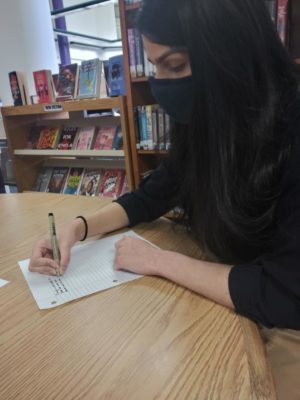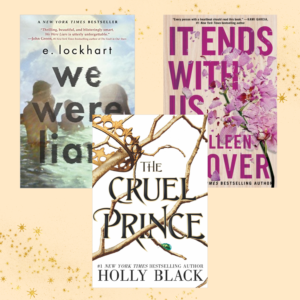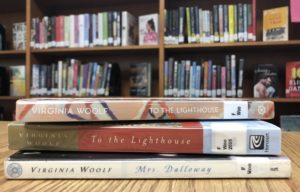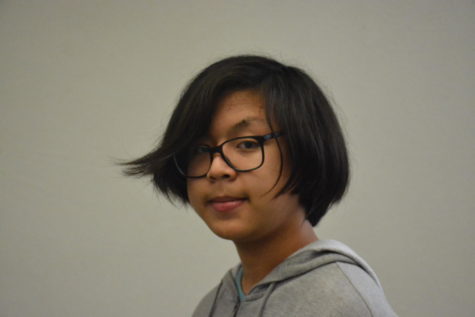Novelists wield words to craft worlds
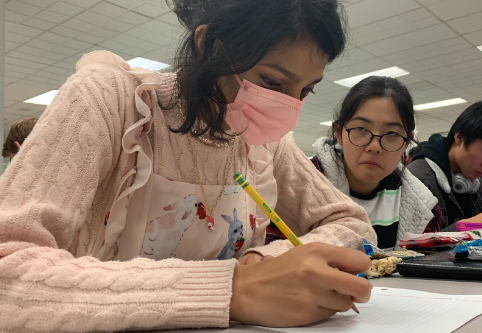
Freshman Ananya Nanduri plans a chapter of a work-in-progress novel, a tragic romance dealing with corruption, hypocrisy and selfishness, while receiving feedback from freshman Jinna Hyun during lunch period.
January 17, 2023
It begins with a moment of inspiration, and after hours upon hours of writing, what was once just a passing idea evolves into a world of characters and conflict. Using words as their preferred artistic medium, creative writers express themselves through both fiction and nonfiction works, with poems, journals and novels being just a few.
“I am working on writing my second book and my first novel,” senior Nisha Shankar said. “It’s called ‘The Sane Society,’ and it’s a murder mystery novel that revolves around these five students that are accused of killing their classmate.”
Out of the many forms creative writing can take, the process of novel writing can take the most time and commitment. According to a survey by Reedsy, most writers take six months to a year to write a novel, but it can take even longer depending on factors like page count and the number of revisions made.
“My novel has had to be rewritten multiple times over the years and every time, my language and phrasing gets better,” freshman Ananya Nanduri said. “The characters and storyline have also evolved to be more interesting and complex. I feel proudness in looking at my old work and then comparing it to what I have now. ”
The satisfaction of seeing an artistic vision come to fruition is not the only benefit writers can enjoy. According to Psychology Today, writing a novel can increase a person’s empathy and ability to organize their emotions during times of hardship. However, the novel writing process does not come without its frustrations. Many writers struggle with writer’s block, which occurs when a writer finds themselves unable to produce new material for an extended period of time.
“Having an intense period of writer’s block can be really annoying,” Shankar said. “It’s not that I don’t have anything to write. It’s just that everything I want to write is absolute trash, and I could not deal with myself if I even wrote it down. It usually takes me driving or doing something other than writing for when the ideas start to flow”
Oftentimes writers will feel stuck when working on a novel, and it is up to the writer to find what methods best motivate them. Some writers find it best to take a break from writing altogether, while others work best by seeking help from others.
“Whenever I finish a page, I have friends proofread it for anything that is too confusing or has me rambling about things unneeded,”Nanduri said. “Having people suggest ideas can really help me.”
Writers have also taken to writing challenges as means of becoming more disciplined writers. A month ago, the 23rd annual National Novel Writing Month, known as NaNoWriMo for short, took place worldwide. The event challenges creative writers to prioritize quantity over quality by writing as many words of a novel as they can during the 30 days of November. In 2021, there were 427,653 registered participants of NaNoWriMo.
“Writing is kind of like a muscle,” creative writing teacher James Steck said. “The more you exercise it, the more fluency you’ll gain as a writer, and the more comfortable you’ll be with quieting the voice we have in the back of our heads that tells us ‘oh, this sounds bad’ or ‘this doesn’t sound right.’”
Even if the task of writing a novel sounds daunting, or if publication seems out-of-reach, writing is open to everyone. Students can explore creative writing through the Creative Writing elective, and can also submit written works to the Andromeda literary arts magazine.
“Creative writing is about what we’re able to do with our self expression and how we can more effectively articulate how we feel about the world and the kinds of conversations we have with the things we encounter in life,” Steck said. “It’s really more about engaging with the world and all its various contradictions and difficulties.”


